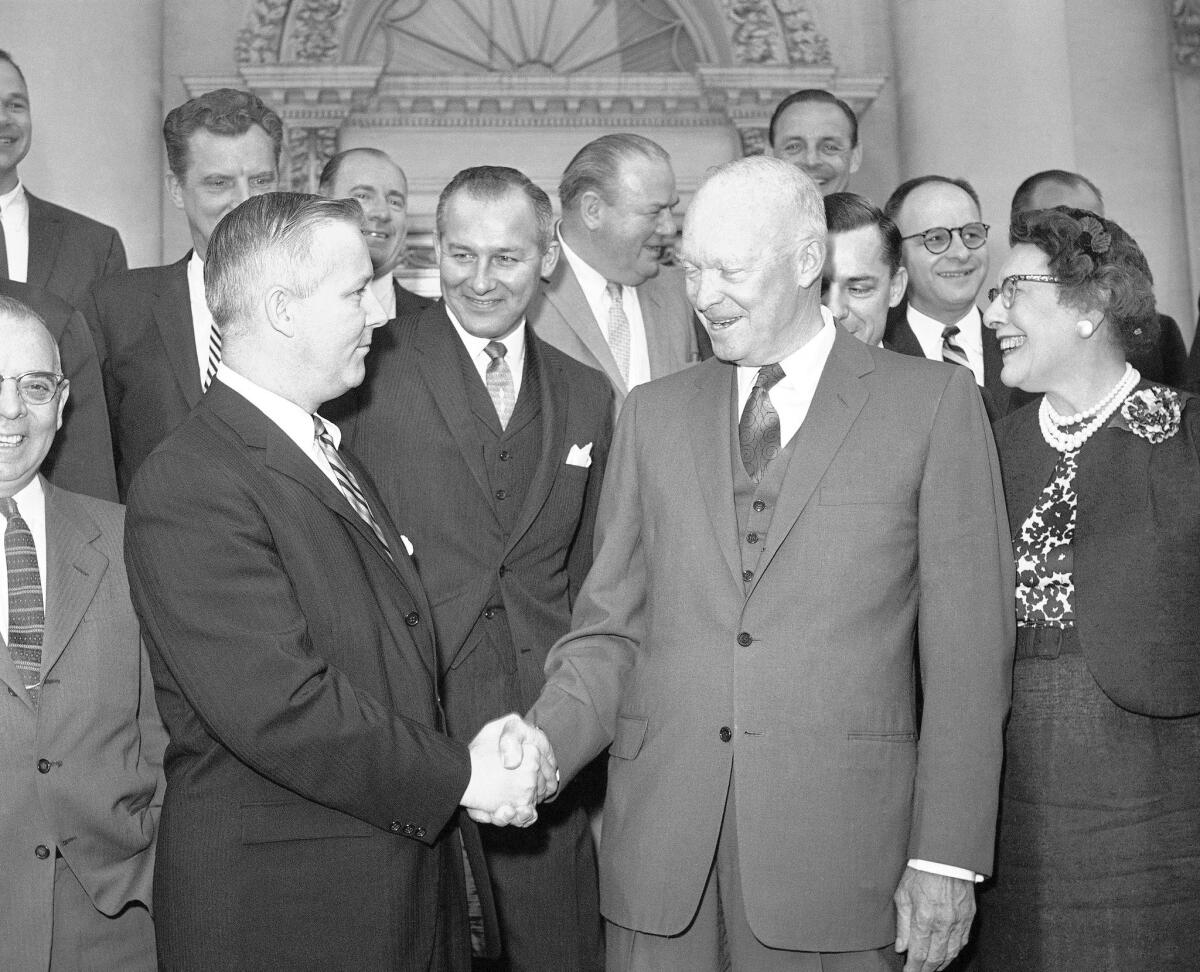Arch Alfred Moore Jr., former West Virginia governor, dies at 91

- Share via
Former Gov. Arch Alfred Moore Jr., his era’s most successful Republican in Democrat-dominated West Virginia, has died. He was 91.
One of Moore’s daughters, U.S. Sen. Shelley Moore Capito, issued a statement saying her father died Wednesday in Charleston, W.Va. The cause was not given.
The three-term governor, congressman and state legislator first won public office in 1952. He was the first West Virginia governor since the late 1800s to win a consecutive second term and remained the only one to hold three full terms.
Moore possessed personal charisma, strong oratory gifts and an uncanny ability to recall names — attributes that helped him score important political victories — but his successes were also deeply tainted by his guilty plea to federal corruption charges in 1990.
He later argued he was innocent and attempted to regain his law license, lost upon his criminal convictions, but was rebuffed in a unanimous 2003 state Supreme Court ruling.
He was born April 16, 1923, in Moundsville, W.Va., into a family with GOP ties. A grandfather had been a mayor of Moundsville, while an uncle had been minority leader in the state’s House of Delegates. Moore joined the Army during World War II, rose to the rank of sergeant and was awarded the Bronze Star as well as a Purple Heart after being shot and severely wounded in the European theater.
After the war, Moore attended college and became a lawyer in 1951. He entered politics the following year, winning a seat in the House of Delegates.
Moore then set his sights on Congress, winning a seat in 1956. He remained in the House of Representatives for six terms, surviving redistricting and winning reelection by ever-increasing margins despite the Democrats’ voter dominance.
In 1968, Moore was elected governor. Over three terms he encountered a national coal strike, a massive road-building effort, frequent disputes with public workers, multiple teacher pay raises, a 1986 prison riot, and repeated clashes with the Democratic-majority Legislature over state finances.
But his tenure was also marked by the 1972 Buffalo Creek disaster. The collapse of a coal waste dam triggered a flood that killed 125 people, injured 1,100 and wiped out entire communities in Logan County. Days before leaving office in his second term, Moore settled the state’s $100-million lawsuit against dam owner Pittston Coal Co. for $1 million.
Corruption allegations had dogged Moore since his first term. In 1975, he became the state’s first sitting governor to be charged with a crime when a federal grand jury indicted him and his 1972 campaign manager on extortion charges. They were found not guilty after a trial.
Moore was indicted again on federal corruption-related charges in 1990, two years after losing his bid for a fourth term as governor. He pleaded guilty the following month to five felonies: extortion, obstruction of justice, mail fraud and two counts of filing false income-tax returns. Moore spent 33 months in federal confinement.
After his conviction, Moore petitioned to take back his guilty pleas. He alleged they were part of a gambit, which he blamed on his defense lawyer, to gain more information about the prosecution’s case. The state, meanwhile, sued Moore over his misconduct in office. He settled in 1996 for $750,000 without admitting fault.
Moore’s wife, Shelley Riley Moore, died in September. Besides Capito, he is survived by another daughter, Lucy Moore Durbin, and son Arch A. Moore III.
More to Read
Start your day right
Sign up for Essential California for the L.A. Times biggest news, features and recommendations in your inbox six days a week.
You may occasionally receive promotional content from the Los Angeles Times.






